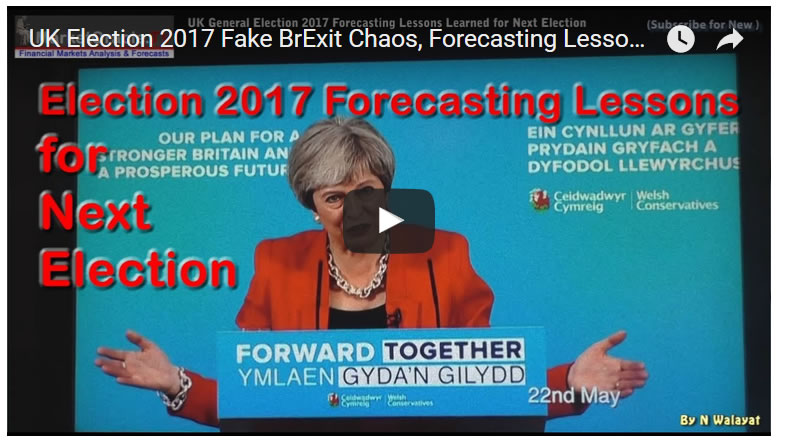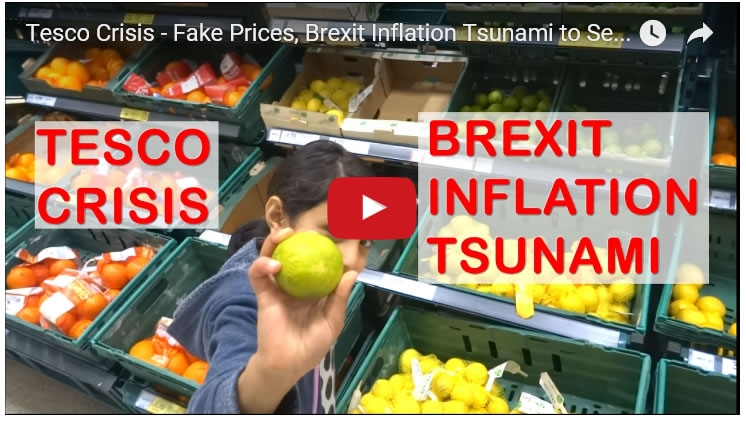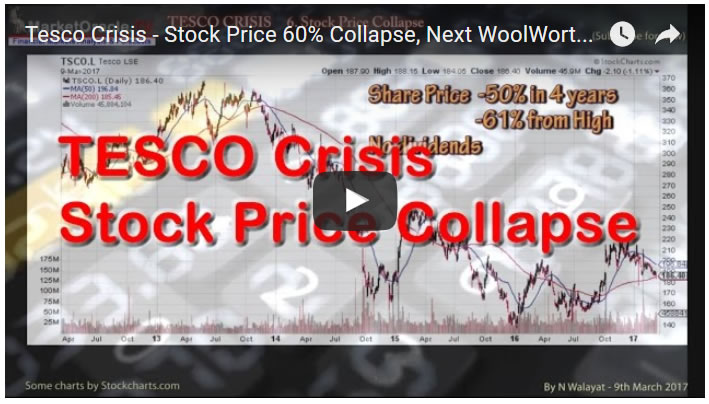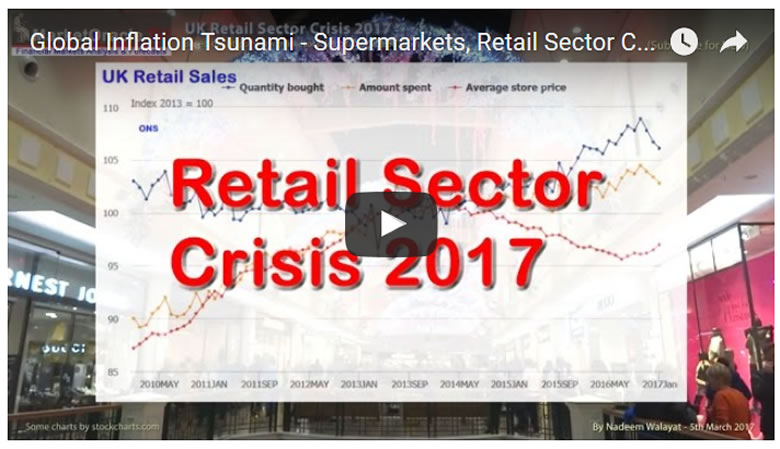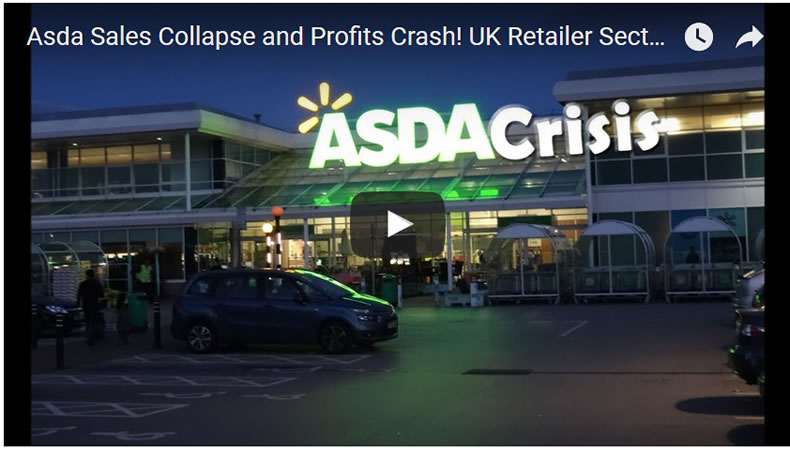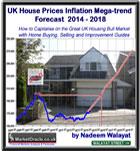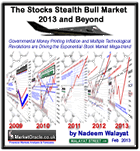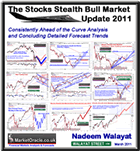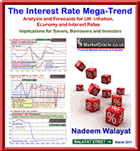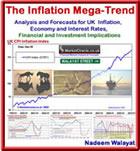Soaring Inflation Plunges UK Economy Into Stagflation, Triggers Government Pay Cap Panic!
Economics / Inflation Sep 13, 2017 - 06:47 AM GMTBy: Nadeem_Walayat
 The consensus circus that the mainstream press journalists rely upon to produce their daily copy i.e. economists, have once more been caught by surprise as UK inflation rockets higher to 2.9% for August up from 2.6% for July. Now standing on the threshold of breaking above 3% as the implications of sterling's sharp drop in the wake of the Brexit vote continues to feed through to rising import prices and therefore providing persistent upwards pressure on shop prices as suppliers restock at much worse exchange rates that already depressed retailers such as the big supermarkets had delayed fully implementing that I have ben warning all year was likely to result in a crisis for the retail sector during 2017, that literally faces a perfect storm which could even result in a Woolworth's moment...
The consensus circus that the mainstream press journalists rely upon to produce their daily copy i.e. economists, have once more been caught by surprise as UK inflation rockets higher to 2.9% for August up from 2.6% for July. Now standing on the threshold of breaking above 3% as the implications of sterling's sharp drop in the wake of the Brexit vote continues to feed through to rising import prices and therefore providing persistent upwards pressure on shop prices as suppliers restock at much worse exchange rates that already depressed retailers such as the big supermarkets had delayed fully implementing that I have ben warning all year was likely to result in a crisis for the retail sector during 2017, that literally faces a perfect storm which could even result in a Woolworth's moment...
The latest inflation data saw prices soaring during August 2017, jumping on the governments preferred economic propaganda measure of CPI from 2.9%, which compares to 0.6% pre-brexit, a 0.3% jump in one month that annualises to a 3.6% momentum rate. Whilst the more widely recognised RPI inflation rate also added 0.4% rising to 3.9% from 3.6% (1.4% pre-brexit), and real demand adjusted inflation broke above 5% to 5.1% (1.9% pre-brexit). Whilst factory gate price inflation also rose to 3.4%, from 3.2%, thus continuing to signal higher future inflation.
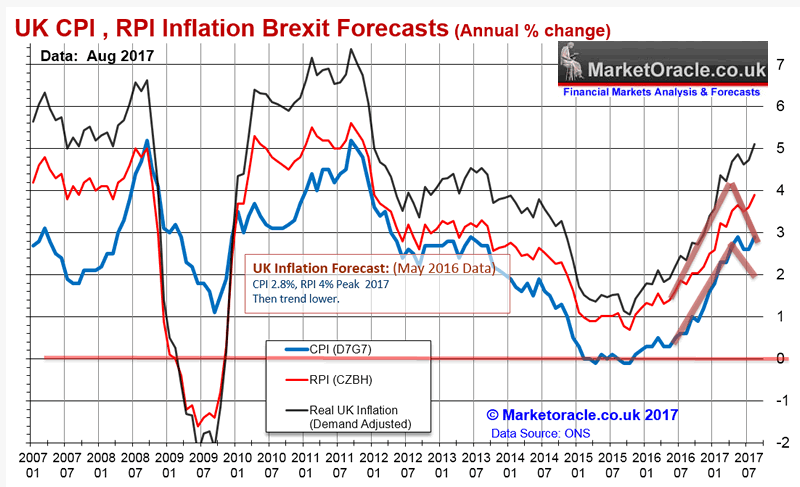
Whilst my long standing forecast expectations since shortly after the Brexit vote of last year were for a rapid rise in the rate of UK inflation towards a peak of CPI 2.8% and RPI 4% before declining by the end of 2017:
- 04 Jul 2016 - BrExit Implications for UK Stock Market, Sterling GBP, House Prices and UK Politics...
- 04 Jul 2016 - BrExit Implications for UK Economy, Interest Rates, Bonds, Markets, Debt & Deficit, Inflation...
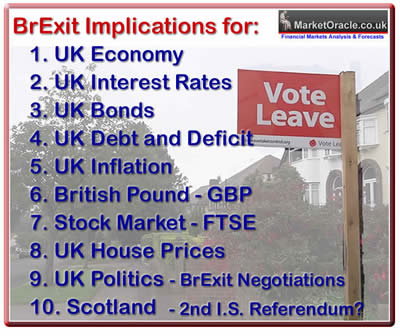
However the reason why Britain's inflation trend goes far beyond the Brexit sterling plunge expectations are because the UK is also subject to a global inflation surge as a consequences of 8 years of central bank zero interest rates and rampant money printing as the US CPI inflation graph illustrates.
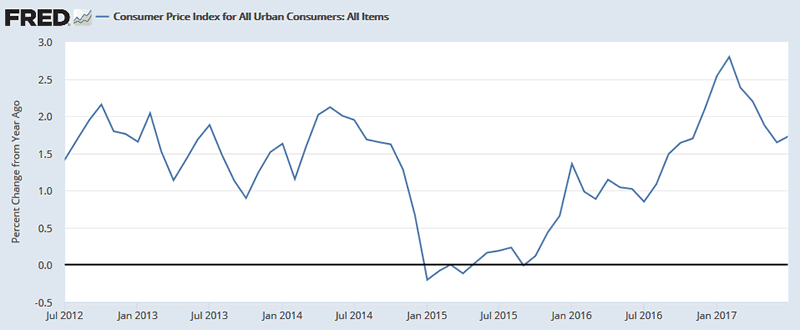
Similarly Germany the bastion of price stability this year has seen inflation soar from zero to 2%, rising to its highest level for many years, with the economic basket cases such as Spain also inflating away at 2%, that collectively has sent euro-zone inflation soaring towards 2%, all of which is a far cry from the persistent deflation propaganda of economies that have remained in economic stagnation, even depression for the past 7 years.
The big question mark is the surge in global inflation temporary or are we about to finally see runaway inflation as a consequence of the world central banks collectively having conjured some $20 trillion out of thin air and printed about $100 trillion in additional debt (government bonds) to save the bankrupt banking crime syndicate. Rampant money printing that asset prices such as housing and stocks have already greatly leveraged themselves to in the mother of all bull markets, far beyond anything any one could have imagined back at the start of the bull run in 2009.
Well clearly 2017 has seen significant seepage out of the banking / asset price system towards feeding the wage price spiral (including in work benefits), the consequences of which will be for the further loss of purchasing power of savings / bond investments and earnings. Whilst continuing to inflate the price of assets that cannot be easily printed such as housing.
In respect of which the UK government in a panic announced the abandonment of the public sector 1% pay cap policy that has been in place since 2010, immediately offering a 2% pay rise to the Police and Prison officers . Though it should not come as any surprise that given inflation soaring to above 5% (RPI) that a 1% pay cap was completely untenable, especially given the disaster that was the June General Election. Towards which my extensive analysis concluded that falling real terms pay played a major role in the surprise election outcome.
https://youtu.be/qL2sTLpeCGI (20 mins)
All of which has contributed to the ongoing sustained spike in UK inflation this year as the temporary Brexit inflation tsunami wave is being absorbed into a global rising inflation climate, the real world consequences is the severe impact on consumers who had already been hit with energy price hikes of as much as 14% from the likes of NPower with city councils across England hiking council tax by 5% to 10% to cover the shortfalls in central government funding, all of which is leading towards a perfect storm for the retail sector that I warned at the start of the year was set to trigger thousands of job losses and store closures.
Therefore my inflation expectations remain as from the start of this year for UK CPI to spike above 3% and then remaining in the 2-3% range well into 2018.
STAGFLATION
Current wage growth is estimated at 1.9% down from 2.1%, so official inflation at 2.9% continues to exceed worker earnings implying that workers at best have been just standing still. However in reality actual inflation is far higher with RPI at 3.9% and real demand adjusted inflation at 5.1% implying that the UK economy has been in stagflation for the whole of this year, one of the real terms erosion of the purchasing power of earnings, i.e. falling demand which increases the risks of a recession as the economy enters a depressed stagnant state where workers are not able to maintain consumption of goods and services resulting in economic depression with inflation i.e. stagflation.
Therefore my expectations remain for UK GDP to decline to sub 1% by the end of this year.
INTEREST RATES
Normally one would expect the Bank of England to respond to soaring inflation by hiking interest rates. Unfortunately we have not been living in normal times since 2008. Therefore it is highly probable the Bank of England will do nothing instead decide to ride out the inflation spike hoping that it turns out to be temporary, especially if the economy starts to stall.
Retail Sector Crisis - Shrinkflation and Fake Prices
The Supermarket giants that dominate Britain's retail sector have both delayed passing on most of the consequences of the sharp fall in sterling to consumer in the form of price hikes and by playing a game of hide the inflation with consumers, which is why the inflation indices are under reporting real inflation.
Once such example of the game all major producers / super markets are playing is one of shrinking package contents. A 10% to 15% cut in pack contents achieves far more inflation than from sterling's drop which on average would equate to about 5% of the price of goods in the shops.
For a real world example of shrinkflation have a look at this photo of a super market shelf selling walkers crisps multi-packs for 99p, do you notice anything strange ?
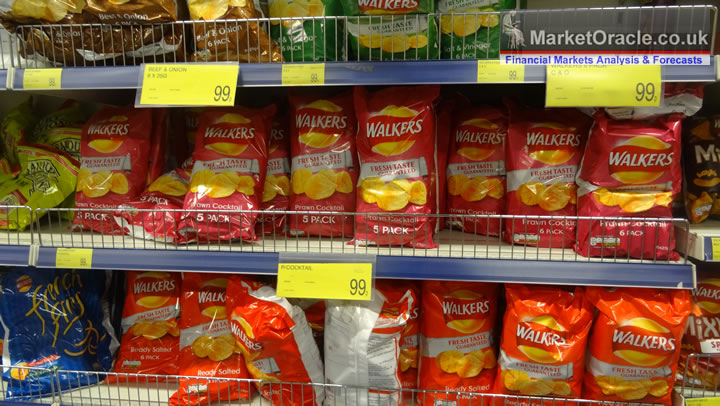
Here's a closer look, now do you see ?
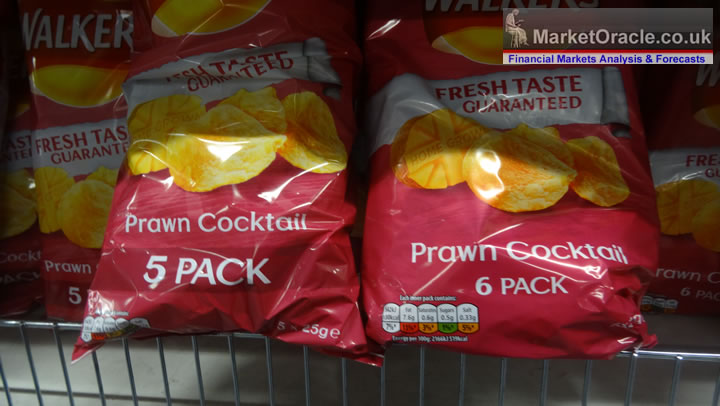
Yes that's right, crisps multi packs that had been sold in packs of 6 are now suddenly being sold in packs of 5 at the SAME price! An effective stealth inflation price hike of 17% on the item without impacting the inflation indices! In fact for ultimate consumer confusion the 5 and 6 packs are even being mixed together to better fool consumers into buying.
However, arrogance born of size has led the super markets to go one step further, perhaps one step too far as the recent BBC investigation into TESCO's FAKE Shelf prices revealed! Shelf prices that FAIL to convert at the checkout tills by virtue of Tesco having left expired offers on the shelf's, effectively fooling customers into buying products at literally DOUBLE the expected price. I covered Tesco's fake shelf prices in the following recent video, though again all of the major super markets play the same game to some extent, it's just that Tesco got carried away and triggered a BBC investigation:
The delays in price hikes and the games the super market giants are playing that customers are eventually seeing through will continue to convert into rising food price inflation during 2017, perhaps by as much as 10% which will have a severe impact on consumers and the already depressed retail sector.
Tesco Crisis - Stock Price 60% Collapse, Next WoolWorth's?
As an example of the pain the retail sector is suffering, Tesco by far ranks as Britain's number 1 retailer in terms of sales of over £54 billion for the last accounting year, more than twice its nearest rival Sainsbury. The Tesco stock price says it all of just how badly run Britain's super market giant has been for many years, which goes beyond the usual dynamics of a badly run businesses that over expanded during the good years. For you know when a companies in deep trouble when the Serious Fraud Office has been investigating it for several years. And whilst the fraud is estimated at £326 million, however when it's all done and dusted the verdict could be accompanies by an even bigger shock to Tesco's finances, a mega-fine of upwards of £500 million.
At £1.87 the Tesco share price is trading at LESS than 50% of its 2013 high. That's a 50% LOSS of stock market value over the past 4 years, valuing the super market giant today at just £15bn. I am sure many inexperienced investors looking at the 50% collapse in the Tesco share price might be imagining how cheap Tesco is right now, find out what the prospects are for Tesco's stock price in my latest video.
More on the retail sector crisis during 2017:
Whilst my most recent video in the retail sector crisis series took a look at the prospects for Britain's third largest retailer, Asda.
Ensure you are subscribed to my youtube channel for new videos as Britain counts down to a BrExit Nightmare or New Dawn for Britain.
By Nadeem Walayat
Copyright © 2005-2017 Marketoracle.co.uk (Market Oracle Ltd). All rights reserved.
Nadeem Walayat has over 25 years experience of trading derivatives, portfolio management and analysing the financial markets, including one of few who both anticipated and Beat the 1987 Crash. Nadeem's forward looking analysis focuses on UK inflation, economy, interest rates and housing market. He is the author of five ebook's in the The Inflation Mega-Trend and Stocks Stealth Bull Market series that can be downloaded for Free.
 Nadeem is the Editor of The Market Oracle, a FREE Daily Financial Markets Analysis & Forecasting online publication that presents in-depth analysis from over 1000 experienced analysts on a range of views of the probable direction of the financial markets, thus enabling our readers to arrive at an informed opinion on future market direction. http://www.marketoracle.co.uk
Nadeem is the Editor of The Market Oracle, a FREE Daily Financial Markets Analysis & Forecasting online publication that presents in-depth analysis from over 1000 experienced analysts on a range of views of the probable direction of the financial markets, thus enabling our readers to arrive at an informed opinion on future market direction. http://www.marketoracle.co.uk
Disclaimer: The above is a matter of opinion provided for general information purposes only and is not intended as investment advice. Information and analysis above are derived from sources and utilising methods believed to be reliable, but we cannot accept responsibility for any trading losses you may incur as a result of this analysis. Individuals should consult with their personal financial advisors before engaging in any trading activities.
Nadeem Walayat Archive |
© 2005-2022 http://www.MarketOracle.co.uk - The Market Oracle is a FREE Daily Financial Markets Analysis & Forecasting online publication.
Comments
|
Yuriy
20 Sep 17, 19:27 |
DOW 3000
I think DOW has caught you here. 2500 is coming fast. |




